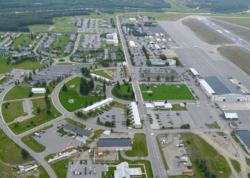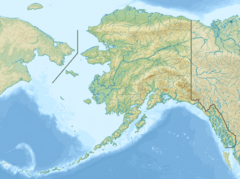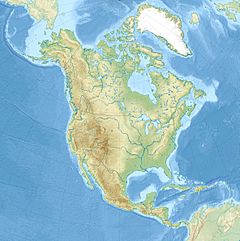Fort Wainwright facts for kids
Quick facts for kids Fort Wainwright |
|
|---|---|
| Fairbanks, Alaska near North Pole, Alaska (Yukon Training Area) |
|

Aerial view of main post
|
|
| Type | Army post |
| Site information | |
| Controlled by | United States Army |
| Site history | |
| Built | 1941 (as Ladd Field) |
| In use | 1941–present |
| Garrison information | |
| Current commander |
COL Nathan S. Surrey |
| Garrison | 1st Infantry Brigade Combat Team, 11th Airborne Division United States Army Garrison Alaska |
|
Military Installation
|
|
| Country | United States |
| State | Alaska |
| Borough | Fairbanks North Star Borough |
| Area | |
| • Total | ~2,500 sq mi (~6,475 km2) |
| Population | |
| • Total | ~15,000 |
| Time zone | UTC−8 (Alaskan (AST)) |
| • Summer (DST) | UTC−9 (AKST) |
| ZIP Code |
99703
|
| Area codes | 907 |
Fort Wainwright is a large United States Army base located in Fairbanks, Alaska. It is part of the Fairbanks North Star Borough. This base is managed by the U.S. Army Garrison Alaska (USAG Alaska). The main command here is the 11th Airborne Division.
Fort Wainwright has had a few names over the years. It was first known as Ladd Field from 1939 to 1945. Then it became Ladd Air Force Base from 1947 to 1961. It was renamed Fort Wainwright to honor General Jonathan M. Wainwright. He was a brave leader during World War II and received the Medal of Honor.
Ladd Field was recognized as a special historic place in 1985. It was called a National Historic Landmark. Fort Wainwright is huge! It covers over 1.6 million acres of land. This makes it the largest U.S. military base outside the main part of the United States.
Contents
Where is Fort Wainwright?
Location in Alaska
Fort Wainwright is in a part of Alaska called Interior Alaska. It sits between the Alaska Range mountains to the south and the Brooks Range mountains to the north. The base is within the Fairbanks North Star Borough. The city of Fairbanks is to its west. The city of North Pole is to its southeast. The Chena River flows through Fort Wainwright. This river is about 100 miles long and flows into the Tanana River.
People at Fort Wainwright
About 15,000 people live and work at Fort Wainwright. This includes around 6,500 military members. There are also about 5,700 family members who live with them. Plus, about 1,250 civilian workers and over 400 contractors work on the base.
Weather and Climate
Fort Wainwright has a subarctic climate. This means it has very hot summers and very cold winters. Temperatures have ranged from a super cold −66°F (−54°C) to a very hot +94°F (+34°C). In January, the average low temperature is around −17°F (−27°C). In July, the average high temperature is about +73°F (+22°C).
The area gets about 12 inches (305 mm) of rain each year. It also gets about 37 inches (94 cm) of snow. Fort Wainwright is about 190 miles south of the Arctic Circle. In June, the sun stays up for about 22 hours. Even at night, it's still a bit bright. In December, there are less than 4 hours of daylight. This extreme weather makes it hard to build things. It also means some people might feel a bit down in the winter due to less sunlight.
Ground Conditions
Fairbanks is in an area with "discontinuous permafrost." This means the ground is frozen for a long time, but there are also unfrozen spots. The ground also freezes and thaws with the seasons. This can make the ground move or even collapse. So, building things here needs extra careful planning.
History of Fort Wainwright
Fort Wainwright began in 1939 as Ladd Field. It was part of the U.S. Army Air Corps. In 1947, it became part of the new U.S. Air Force and was renamed Ladd AFB. Its job was to test aircraft in very cold, arctic conditions.
In 1961, the base was given to the Army. It was then renamed Fort Wainwright. This was to honor World War II General Jonathan Wainwright. From 1963 to 1972, it was home to the 171st Infantry Brigade. Later, from 1986 to 1998, it was the home of the 6th Infantry Division.
In 2006, a unit called the 172nd was renamed. It became the 1st brigade of the 25th Infantry Division. Fort Wainwright also had Task Force 49. This was an aviation group that helped the U.S. Army in Alaska with air support.
Life at Fort Wainwright
The Army works hard to make life better for soldiers and their families at Fort Wainwright. In 2019, the Army started a special program to improve living conditions. This was because Fort Wainwright is in a very cold and remote place.
Some improvements include special blackout curtains for barracks. These help soldiers sleep during the long summer days when the sun is out for almost 24 hours. They are also building better facilities for winter work. Soldiers get generous leave policies. This helps them spend more time with their families and feel less isolated.
By 2022, the Army and Defense Health Agency hired more counselors. These helpers support soldiers and their families. They also made it easier for new families to get things like loaner furniture. They increased funding for the base shuttle and improved access to ski facilities. In 2021, a new program called "Option 20" started. This lets new Army recruits choose Alaska as their duty station. This helps more people who want to be in Alaska get stationed there.
Protecting the Environment
Cleaning Up the Base
Since 1978, Fort Wainwright has been working to clean up its land. This is part of a program to investigate and clean up pollution. In the 1980s, harmful chemicals were found in the water and soil. About 15,000 people live and work at the fort. They get their drinking water from wells near these areas. The Chena River also flows through some of these spots.
Superfund Site
In 1990, Fort Wainwright was added to the national priorities list. This means it became a Superfund site. This is a place with serious pollution that needs a big cleanup. The groundwater has chemicals from solvents and petroleum. The soil has waste oil, pesticides, and other harmful substances. Some sediments in the river also have chemicals.
Taku Gardens Housing Area
In 2005, construction started on a new housing area called Taku Gardens. Workers found stained soil and strange smells. Tests showed high levels of a chemical called PCB. Other harmful chemicals were also found. Building was stopped for a while. An Army review found that rules were not followed when planning the housing.
From 2007 to 2010, contaminated soil was removed. But some polluted soil and groundwater still remain. Construction of the housing continued in 2011. The Taku Gardens area was later renamed Tanana Trails in 2015.
Hangar 6 Incident
In 2006, workers at Aircraft Maintenance Hangar No. 6 got sick from fumes. They felt nauseous and had headaches. A health report said an unknown chemical likely caused nerve damage. More than 30 workers went to the hospital. Some suffered lasting health problems.
Underground Fuel Tanks
From 2012 to 2013, inspections found that Fort Wainwright did not check its underground fuel tanks often enough. They also didn't test for leaks or investigate possible spills. The Army had to pay a fine for these issues.
Major Units at Fort Wainwright
Here are some of the main military units based at Fort Wainwright:
- 11th Airborne Division Arctic Angels
- 1st Infantry Brigade Combat Team, 11th Airborne Division “Arctic Wolves”
- 1st Battalion, 5th Infantry Regiment “Bobcats”
- 1st Battalion, 24th Infantry Regiment “Blockhouse”
- 5th Squadron, 1st Cavalry Regiment “Black Hawks”
- 2d Battalion, 8th Field Artillery Regiment “Automatic”
- 70th Brigade Engineer Battalion “Kodiaks”
- 25th Brigade Support Battalion “Opahey”
- 1st Infantry Brigade Combat Team, 11th Airborne Division “Arctic Wolves”
- 65th Explosive Ordnance Disposal Company “Dreadnought”
- 1st Battalion, 52d Aviation Regiment
- 1st Battalion, 25th Aviation Regiment
- 17th Combat Sustainment Support Battalion
- Northern Warfare Training Center
- U.S. Army Garrison Alaska - Installation Management Command
- Medical Department Activity – Alaska (Bassett Army Hospital/Veterans Center)
- Dental Activity - Alaska
- Veterinary Command
- U.S. Army Reserve Center
 | Shirley Ann Jackson |
 | Garett Morgan |
 | J. Ernest Wilkins Jr. |
 | Elijah McCoy |



